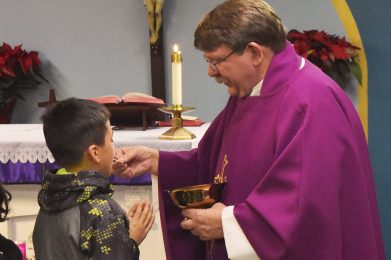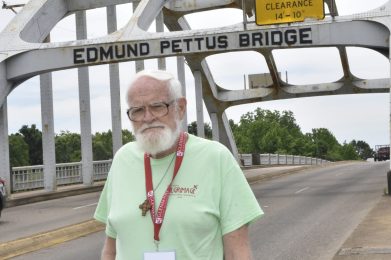Christian unity is a real and important part of mission work. Glenmary’s Nathan Smith is dedicated to making that happen. By John Feister
Nathan Smith is fulfilling a long-held Glenmary hope. This former Protestant minister, now Catholic and a lay leader in Glenmary, is reaching out to the non-Catholic Christians who are a big part of Glenmary missions. Many of these Christians would not consider themselves a part of any larger denomination.
Nathan follows in the giant footsteps of Glenmary Father Frank Ruff, who made groundbreaking connections for the Church nationally with the Southern Baptist Convention. Nathan is branching out from there to include Pentecostals and nondenominational Christians. It all fits within a broader context, the five “pillars of mission” that Glenmary is all about (see box on opposite page).
“We call it ecumenical ministry,” says Nathan, “a ministry of Christian unity. Within our mission areas, a lot of the other Christians that are in those areas are coming from Evangelical and Pentecostal backgrounds.”
Glenmary founder Father William Howard Bishop taught that entire counties are our missionary concern. “That means that we should partner with the existing Christians,” says Nathan, “in order to see the gospel flourish within those spaces, whichever way that might look.”
It comes from Jesus’ desire for unity, stated most clearly in John’s Gospel at the Last Supper, in Jesus’ prayer that all of his followers might be one (Jn 17). Ecumenism is a fancy name for it all, but that’s not exactly a common word. Nathan tries to keep things accessible, in plain English. Part of that comes from his conversion to Roman Catholicism. He was drawn first by beauty, then to transcendence, then to the Eucharist. And Eucharist, our relationship with Jesus and his Church is, in a sense, both the most simple and the most deeply Catholic thing that we know.
Raising children has probably helped him keep things a little more simple too! He and his wife, Emily, have two very young children who constantly ask the big questions, as most children do. Nathan himself was an Evangelical pastor, which gives him a deep understanding of common ground among Catholics and evangelical Christians.
Who are the Evangelicals?
Southern Baptists are the largest denomination of Evangelical Protestants, but there are many, many other Christian Evangelicals. Think of Methodists or Nazarenes, two very different groups, one mainstream Protestant, one more fundamentalist. Pentecostal, Church of Christ, Assemblies of God, Church of God—the evangelical list goes from A to Z (actually it stops at Wesleyan). Many have little exposure or understanding of Roman Catholicism beyond the media, just as many Roman Catholics have little understanding of Evangelicals. But they have much in common.
Consider this, for example: Many Evangelicals are charismatics. Yet most charismatics globally are Catholic, explains Nathan. Charismatics emphasize the spiritual gifts that most Catholics would recognize from the catechism: wisdom, understanding, counsel, fortitude, knowledge, piety, and fear of the Lord.
Among Evangelicals, says Nathan, “there’s a strong emphasis on one’s personal salvation, and on having a personal relationship with Christ.” This was a big concern for Catholics even in recent years when one of the Creed translations prayed at Mass was retranslated for English speakers as, “I believe in God…” rather than the previous “We believe….” (Both are true, of course, but our bishops were concerned that personal responsibility not to be forgotten.)
Evangelical Christians are deeply devoted to prayer. Sound familiar?
But the most basic place of common ground is our belief in the Christian redemption, says Nathan, “the salvific work of Christ.” In other words, Christ breaks whatever barriers exist between us and God. Nathan lists others: “belief in the Trinity, belief in the role of Christians in the world, serving other people.” Evangelicals are centered on Christ, are devoted to the Cross, and have “a strong emphasis on the role of Scripture guiding one’s life.” And of course, Evangelicals, like Catholics, are missioners.
But misconceptions abound, observes Nathan. “One is that Catholics are thought to believe we only can be saved by their works. Evangelicals believe that if you pray, Christ will enter your heart and forgive your sins; then you’re saved. So there is a deep difference there,” observes Nathan.
Dialogue about all of this is the work of Glenmary’s ecumenical ministry, which Nathan leads.
Working with leaders
Much of this work is happening in local communities, and Nathan sometimes visits Glenmary parishes to give workshops among Christians of many faiths that local Glenmarians are working with, week to week.
Yet Nathan spends much of his time forging relationships with leaders and thinkers from other Christian traditions. For example, Nathan and Evangelical layman Alexei Laushkin led a dialogue over the past few years that resulted in a groundbreaking statement of areas of agreement among Catholics and others nationally, one endorsed by both the US bishops’ ecumenical office and Laushkin’s Kingdom Mission Society (see here for more on The Gift of Being Christian Together). It is being used as a study tool primarily in the US and also by some European Christians.
Another example: Last year Nathan was invited by the Vatican’s Dicastery for Promoting Christian Unity to be one of two North American Catholic representatives at a worldwide gathering in Ghana, Africa, of the Global Christian Forum.
And closer to home, there is a gathering at St. Meinrad Seminary in Indiana, a theological discussion among Catholics and Evangelicals. In November, Nathan will give a talk in Philadelphia to a group representing five major families of Christian Churches about new approaches to inter-Church discussions, ecumenism.
All of these points of contact are opportunities to grow the relationships that lead to mutual understanding and unity among Christians. Yes, there are committees, formal discussions, ways of doing things, says Nathan, but fundamentally, “it’s looking out, being attentive to the Holy Spirit at work within another person’s life. Listening is a big part of that.” For Nathan, that goes from Glenmary missions to the broadest corners of the Church.






